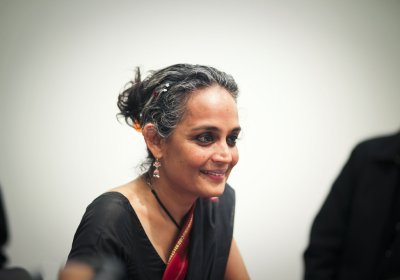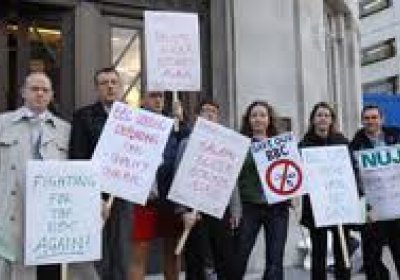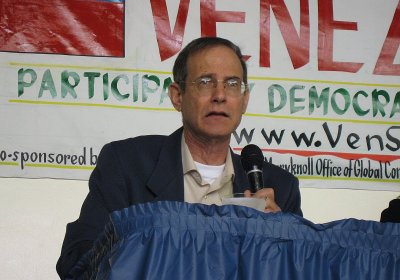Blowing The Roof Off The Twenty-First Century: Media, Politics, and the Struggle for Post-Capitalist Democracy
Robert W McChesney
Monthly Review Press
272 pages
Published November 2014
www.blowingtheroofoff.com
The work of renowned media critic Robert McChesney “has been of extraordinary importance”, says the “world's top public intellectual”, Noam Chomsky. Green Left Weekly's Mat Ward spoke to McChesney about his new book, Blowing The Roof Off The Twenty-First Century.
* * *
Media
Green Left Weekly is taking a break for the summer from December 11 to January 22. To fill the void, it asked staff, contributors and others to recommend their favourite books of the year.
Rachel Evans
Green Left Weekly writer, activist, organiser
How to Make Trouble and Influence People
By Iain McIntyre
http://goo.gl/l7GOfx
Digital Disconnect:
How Capitalism Is Turning the Internet Against Democracy
Robert W McChesney
Spring 2013
www.thenewpress.com
When award-winning author Robert McChesney wrote a much-needed political and economic analysis of the internet, the reaction from his peers was not quite what he expected.
A selection of this week's celebrity news...
Talib Kweli: Rapper says of Boston bombing, 'violence begets violence'. http://bit.ly/11fowMJ
Lauryn Hill To Record New Music To Pay Tax Bill? http://bit.ly/15Ip82z
Yoko Ono To Unveil Not-For-Profit John Lennon Educational Tour Bus http://bit.ly/ZD71Hz
Flavor Flav Court Hearing Postponed For Rock And Roll Hall Of Fame Induction http://bit.ly/15zP5lh
Rolf Harris Named As Man Arrested In British Sex Abuse Case http://bit.ly/ZvYl5M
Media mogul Rupert Murdoch described his appearance before the British parliamentary hearing into the News Of The World’s phone hacking scandal as the “most humble day” of his life.
His son, James, added: “It’s a matter of great regret … these actions do not live up to the standards that our company aspires to around the round.”
How does political censorship work in liberal societies? When my film, Year Zero: the Silent Death of Cambodia, was banned in the United States in 1980, the broadcaster PBS cut all contact. Negotiations were ended abruptly; phone calls were not returned.
Something had happened. But what?
Year Zero had already alerted much of the world to the horrors of Pol Pot, but it also investigated the critical role of the Nixon administration in the tyrant’s rise to power and the devastation of Cambodia.
Remembrance Day, on November 11, was celebrated again this year in the Australian media with pictures of red poppies and flag-draped coffins and historic photos of Australian soldiers who gave “the ultimate sacrifice” from the human-made wasteland of Flanders to the stony deserts of Afghanistan.
Paying tribute to the ten soldiers killed this year in the long war in Afghanistan, Governor-General Quentin Bryce said that Australians were good at remembering: “We seem to know what we ought to hold onto and what is best let go.”
Climate deniers love banging on about media bias. It’s a favourite theme.
They claim media outlets suppress the debate, peddle global warming hysteria and refuse to give deniers an equal hearing.
Indeed, the evidence (always a knotty issue for deniers) shows that there is a glaring bias in the way the Australian media covers climate change. But it’s a bias for climate denier propaganda, not against it.
Take the Rupert Murdoch-owned media empire: Australia’s largest. The editorial line of its flagship broadsheet, the Australian, is notorious for its climate denial.
World renowned novelist and global justice activist Arundhati Roy is facing escalating threats of violence in India because of her support for justice in Kashmir — the disputed region partitioned between India and Pakistan and occupied by military forces in the area India controls.
Roy faced sedition charges for comments she made about Kashmir at a public meeting in October. The government has since indicated it would not pursue the charge.
BBC services were severely disrupted after a 48-hour walkout on November 5 and 6 by thousands of media workers. MorningStarOnline.co.uk said on November 5 the workers were fighting the corporation’s “pensions robbery”, which would result in payouts being dramatically reduced.
The corporation’s director general Mark Thompson claimed the National Union of Journalists (NUJ) strike had no impact, but viewers and listeners tuned into BBC radio and TV channels to find the flagship program off air.
When US director Danny Schechter’s 2006 film In Debt We Trust predicted a huge financial crisis was coming, he was laughed at. It turned out he was right.
His latest film, Plunder: The Crime of Our Time shows how the crisis was created by Wall Street bankers breaking the law to manipulate the markets — and suggests a bigger crisis is on the way.
On September 28, a British Guardian reporter who interviewed me by phone published an article on the September 26 Venezuelan National Assembly elections titled “Opposition Gains Loosen Chavez’s Grip on Power.”
According to the article, I said the electoral results “suggested the government should try to modify its radical discourse and accommodate the opposition, as long as it accepted the government’s legitimacy”.
- Previous page
- Page 2
- Next page











